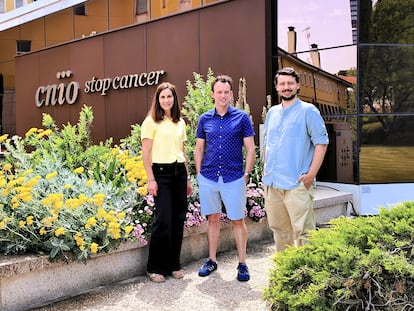A marker has been discovered that indicates which patients will not respond to chemotherapy.

Biologists Geoff Macintyre and Barbara Hernando are used to witnessing chaos. Their specialty is studying the nucleus of malignant cells in many types of tumors, where major genetic aberrations known as genomic instability occur. This involves large-scale DNA damage that would be unimaginable in healthy cells and, for reasons not fully understood, makes the disease increasingly rapid and difficult to stop with available drugs, especially when the tumor has spread to several organs, producing metastasis , which is the cause of nine out of ten cancer deaths.
This Monday, Macintyre, Hernando, and other researchers in Spain and the United Kingdom present a new analysis of genomic instability that allows them to predict which patients will not respond to three types of chemotherapy.
"Chemotherapy is a really good treatment when it works," explains Macintyre, a scientist at the Spanish National Cancer Research Centre (CNIO). The problem, he adds, is that globally, up to 50% of patients don't respond to these drugs but still suffer from their side effects.

Scientists have found biomarkers within the vast chaos of genomic instability that indicate whether those cells will be vulnerable to platinum , taxanes, and anthracyclines, three major groups of chemotherapy drugs. Researchers analyzed data from more than 800 patients with ovarian, breast, prostate, and sarcoma tumors. The work was published this Monday in Nature Genetics .
"What we want to do is predict which patients will be resistant to these drugs, which can help us avoid their toxic effects," says Macintyre, a 44-year-old Australian bioinformatician.
Hernando explains that this analysis would be especially interesting for patients with advanced tumors who only have one more line of treatment left. The genetics of their tumors can reveal which drug won't work, which would help oncologists apply another type of chemotherapy that might be effective. "Normally, biomarkers in cancer work exactly the other way around, telling you if a treatment will work, but this type of approach can end up helping to select a better treatment and also increase patient safety," emphasizes this 33-year-old molecular biologist from Castellón.
This team has contributed to the creation of the largest atlas of genomic aberrations in cancer, published in 2022. The data from more than 9,000 tumors showed the wide variety of large-scale genetic lesions that cause different types of cancer. The main objective of this work is to understand more about this chaos, develop new, more personalized treatments that can be applied in early stages, and perhaps be able to better combat tumors with very poor prognoses.
On December 2, 1943, German troops bombed the port of Bari, Italy. They killed more than 1,000 Allied soldiers and sank 17 ships. The "little Pearl Harbor" had a very unfortunate consequence. The explosions released mustard gas, which affected many of the survivors, killing the cells in their bone marrow and lymphatic system. This was a key discovery in the development of the first chemotherapy drugs, based on toxic agents directed against malignant cancer cells. Since its discovery, chemotherapy has been a fairly indiscriminate treatment, sometimes also affecting healthy cells. For the first time, genomic instability tests could make these treatments more targeted, Macintyre argues.
The project poses an ethical issue, the researcher warns. “In a normal situation, doctors give chemo to their patients without knowing whether they'll respond or not. But the moment you have a predictive system like this, an ethical dilemma arises as to whether to administer the treatment or not. That's why we're not conducting a conventional clinical trial. Instead, what we're doing is analyzing data from thousands of already-treated patients and simulating a clinical trial with them, even if it's not prospective,” he explains.
The team is already working on validating the test in collaboration with the 12 de Octubre Hospital , where they will analyze data from cancer patients treated with different types of chemotherapy. They have also founded a biotechnology company to commercialize the genomic instability tests. The project has received €1.3 million in funding from the European Union and the Spanish Government.
Rebeca Lozano, scientific secretary of the Spanish Society of Medical Oncology , who did not participate in the study, believes it is an "interesting" study. A test of this type "can tell us which chemotherapy to avoid because it won't work." The oncologist at the University Hospital of Salamanca emphasizes that currently, it is unknown why up to half of patients do not respond to this type of treatment. If the test is ultimately validated, it could help thousands of patients in Spain alone, and not only with the tumors analyzed, but also with other types. "It would be very useful," she emphasizes.
EL PAÍS

%3Aformat(jpg)%3Aquality(99)%3Awatermark(f.elconfidencial.com%2Ffile%2Fa73%2Ff85%2Fd17%2Fa73f85d17f0b2300eddff0d114d4ab10.png%2C0%2C275%2C1)%2Ff.elconfidencial.com%2Foriginal%2Fb9d%2F672%2F70f%2Fb9d67270f86a776acdee3811ea2424cd.jpg&w=1280&q=100)



%3Aformat(jpg)%3Aquality(99)%3Awatermark(f.elconfidencial.com%2Ffile%2Fbae%2Feea%2Ffde%2Fbaeeeafde1b3229287b0c008f7602058.png%2C0%2C275%2C1)%2Ff.elconfidencial.com%2Foriginal%2Fe06%2F68f%2Fcd0%2Fe0668fcd078966921fa39e4ee99b44b8.jpg&w=1280&q=100)